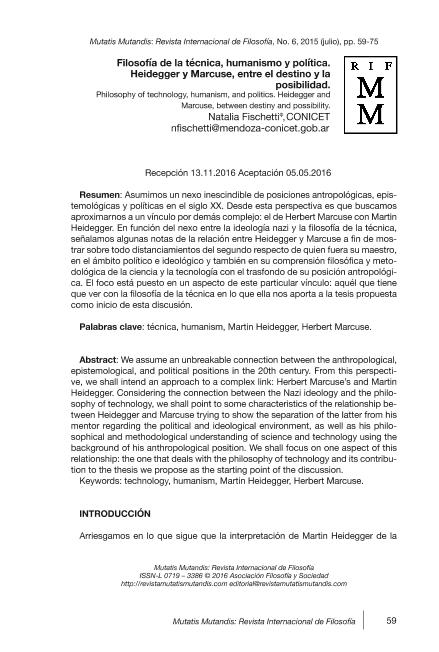Mostrar el registro sencillo del ítem
dc.contributor.author
Fischetti, Natalia Beatriz

dc.date.available
2018-04-27T20:16:40Z
dc.date.issued
2016-07
dc.identifier.citation
Fischetti, Natalia Beatriz; Filosofía de la técnica, humanismo y política: Heidegger y Marcuse, entre el destino y la posibilidad; Universidad de Santiago de Chile; Grupo Editorial Mutatis Mutandis; 6; 7-2016; 59-75
dc.identifier.issn
0719 -3386
dc.identifier.uri
http://hdl.handle.net/11336/43754
dc.description.abstract
Asumimos un nexo inescindible de posiciones antropológicas, epistemológicasy políticas en el siglo XX. Desde esta perspectiva es que buscamos aproximarnos a un vínculo por demás complejo: el de Herbert Marcuse con Martin Heidegger. En función del nexo entre la ideología nazi y la flosofía de la técnica, señalamos algunas notas de la relación entre Heidegger y Marcuse a fin de mostrar sobre todo distanciamientos del segundo respecto de quien fuera su maestro, en el ámbito político e ideológico y también en su comprensión filosófca y metodológicade la ciencia y la tecnología con el trasfondo de su posición antropológica.El foco está puesto en un aspecto de este particular vínculo: aquél que tieneque ver con la filosofía de la técnica en lo que ella nos aporta a la tesis propuesta como inicio de esta discusión.
dc.description.abstract
We assume an unbreakable connection between the anthropological, epistemological, and political positions in the 20th century. From this perspective, we shall intend an approach to a complex link: Herbert Marcuse’s and Martin Heidegger. Considering the connection between the Nazi ideology and the philosophy of technology, we shall point to some characteristics of the relationship between Heidegger and Marcuse trying to show the separation of the latter from his mentor regarding the political and ideological environment, as well as his philosophical and methodological understanding of science and technology using the background of his anthropological position. We shall focus on one aspect of this relationship: the one that deals with the philosophy of technology and its contribution to the thesis we propose as the starting point of the discussion.
dc.format
application/pdf
dc.language.iso
spa
dc.publisher
Universidad de Santiago de Chile
dc.rights
info:eu-repo/semantics/openAccess
dc.rights.uri
https://creativecommons.org/licenses/by-nc-sa/2.5/ar/
dc.subject
Tecnica
dc.subject
Humanismo
dc.subject
Martín Heidegger
dc.subject
Herbert Marcuse
dc.subject
Technology
dc.subject
Humanism
dc.subject.classification
Estudios Religiosos

dc.subject.classification
Filosofía, Ética y Religión

dc.subject.classification
HUMANIDADES

dc.title
Filosofía de la técnica, humanismo y política: Heidegger y Marcuse, entre el destino y la posibilidad
dc.title
Philosophy of technology, humanism, and politics: Heidegger and Marcuse, between destiny and possibility
dc.type
info:eu-repo/semantics/article
dc.type
info:ar-repo/semantics/artículo
dc.type
info:eu-repo/semantics/publishedVersion
dc.date.updated
2018-04-24T17:15:39Z
dc.identifier.eissn
0719-4772
dc.journal.number
6
dc.journal.pagination
59-75
dc.journal.pais
Chile

dc.journal.ciudad
Santiago de Chile
dc.description.fil
Fil: Fischetti, Natalia Beatriz. Consejo Nacional de Investigaciones Científicas y Técnicas. Centro Científico Tecnológico Conicet - Mendoza. Instituto de Ciencias Humanas, Sociales y Ambientales; Argentina
dc.journal.title
Grupo Editorial Mutatis Mutandis
dc.relation.alternativeid
info:eu-repo/semantics/altIdentifier/url/http://revistamutatismutandis.com/index.php/mutatismutandis/article/view/99
dc.relation.alternativeid
info:eu-repo/semantics/altIdentifier/url/https://dialnet.unirioja.es/servlet/articulo?codigo=5645440
Archivos asociados
